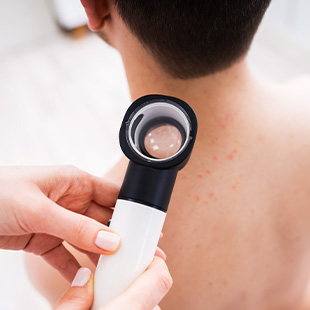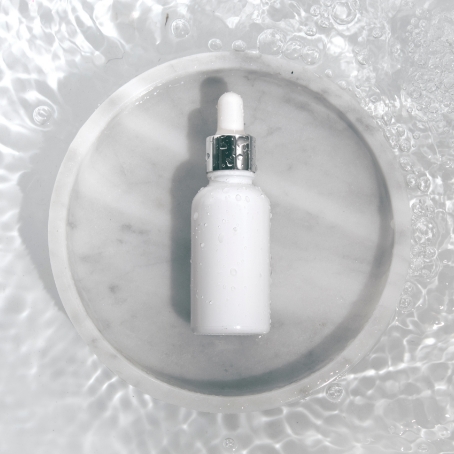On this page


What is Rosacea?
Rosacea is a skin condition that presents as mild to extreme redness, usually at the center of the face. However, this redness can manifest in other areas of the skin as well. It can also come with more than redness, and there are four types of rosacea:
- Erythematotelangiectatic Rosacea: Redness that shows visible blood vessels
- Ocular Rosacea: Redness and irritation within the eyes and around the eyelids
- Papulopustular Rosacea: Redness that comes with swelling and acneic breakouts
- Phymatous Rosacea: Redness that comes with thickness and texture
What Are the Symptoms of Rosacea?
Rosacea is characterized by noticeable facial redness in the cheeks and nose that may feel warm or tender to the touch. The red areas also tend to contain spider veins, or tiny visible blood vessels. The affected skin may seem especially dry or oily. There may also be symptoms like rash, thickening of the skin, irritation, and acne-like bumps.
It’s important to note that rosacea is more than just occasional facial redness – for example, blushing or flushing after exercise is not considered rosacea. However, rosacea may later develop from these occurrences, eventually becoming more persistent or permanent.
REAL PATIENT RESULTS
Visit our gallery to see the Biltmore Difference. We pride ourselves on consistently great results and it is our happy patients who are a true testament to our work.
VIEW BEFORE AND AFTER PHOTOS
What Causes Rosacea?
It’s not entirely known what causes rosacea, but there are some factors that rosacea patients have in common. For example, most rosacea patients are between 30 and 50 years old, fair-skinned, of northern European ancestry, and have struggled with chronic acne. Rosacea can also be hereditary, meaning most patients have family members that also struggle with it.
Scientists believe that the immune system may cause rosacea, as well as the skin’s makeup. Rosacea is most often reactive, however, meaning that certain things can trigger it to flare up. These triggers are usually unique for each patient.
Rosacea Treatment Options
Treatments for rosacea are extremely effective. Medical treatments such as topical prescription creams and oral antibiotics can improve the acne-like component. Lasers can help reduce the redness component of rosacea with very few adverse side effects. Treatment for rosacea is also often paired with determining specific triggers and how you can avoid them. Additionally, our team can help you develop a rosacea-safe skincare regimen to help soothe symptoms as well.

WALK-IN APPOINTMENTS
If you have an immediate concern, you want to find quality care as soon as possible. Our office takes walk-in appointments and will be happy to address your concerns and offer you immediate treatment suggestions and medical care.
LEARN MOREManaging Rosacea
Rosacea is unfortunately often a lifelong condition. One important step in managing rosacea is wearing daily sunscreen to prevent sun damage. This should include an SPF of 30 or higher. Our certified dermatology provider can help you take specific steps to avoid triggers and prevent flareups.
Schedule a Consultation
To learn more about rosacea and how you can manage it, schedule a consultation with our certified dermatology provider. Call our Terre Haute, IN office, fill out our online contact form, or “Walk In Now.”

RYAN T. PATTERSON FOUNDER/CEO, DCNP
Ryan is State Licensed and Nationally Board Certified as a Family Nurse Practitioner (NP-C) by the American Academy of Nurse Practitioners. Additionally, he is board certified as a Dermatology Certified Nurse Practitioner (DCNP) by the Dermatology Nursing Certification Board. He has 23+ years of Dermatology Experience.
Meet The TeamTestimonials
Testimonials

SHOP SKINCARE PRODUCTS
We rely on medical-grade skincare products with quality ingredients clinically proven to restore and maintain skin health. Find your perfect products and develop a customized skincare routine designed to your skin type and skin concerns.






